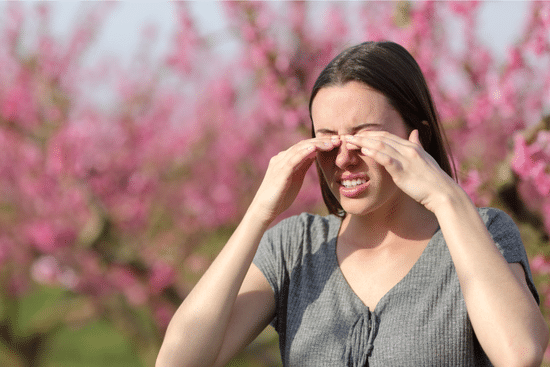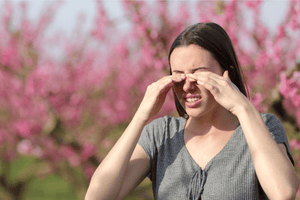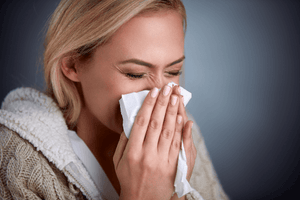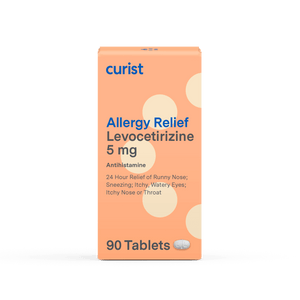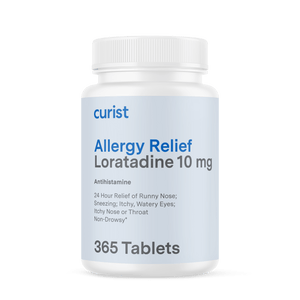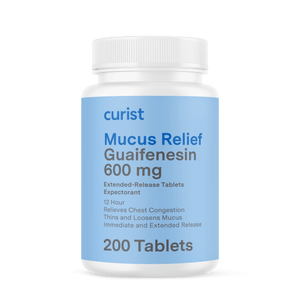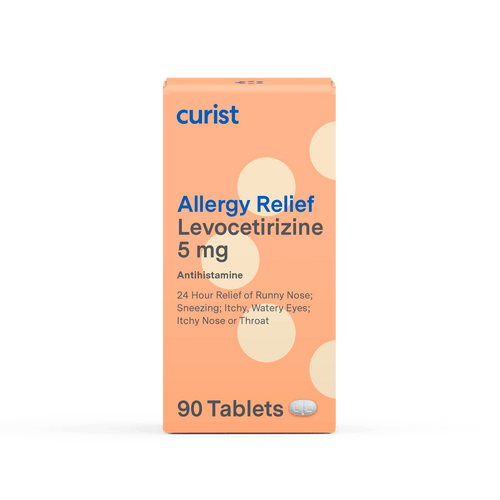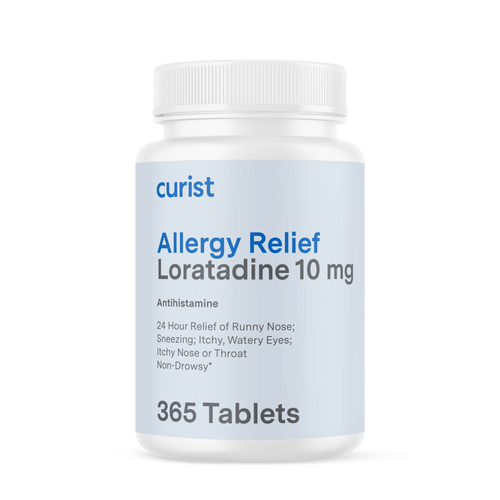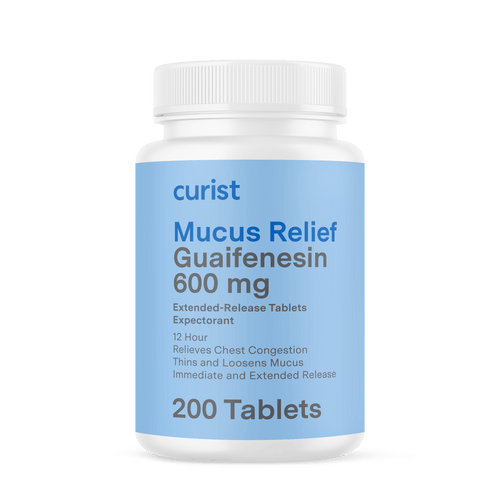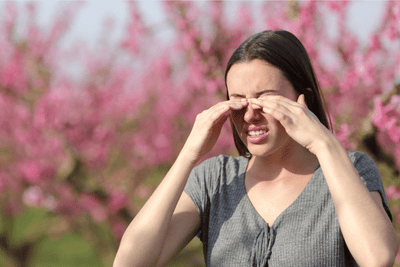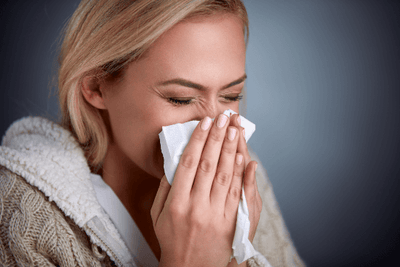By Deni Hui, The University of Texas at Austin College of Pharmacy
Curist delivers over-the-counter medicines to your door at a fraction of the price of traditional brands. We hope everyone stays safe and healthy during this time.
Nothing is more irritating than the feeling that there is something in your eye. If your eyes are itchy, red, and irritated, you may be wondering what might have caused it. Knowing the cause of your itchy eyes can help you find the best treatment and get some relief right away. Continue reading to find the source of your itchy eyes and the best remedy for you!
Why Do I Have Itchy Eyes?
Itchy eyes, also known as ocular pruritus, are a very common problem and affect millions of Americans. Itchy eyes can be caused by a number of reasons including allergies, infection, and strain. If your eyes itch and are red, and you don’t see anything in them, it could be allergies. Symptoms of eye allergies can occur independently but usually accompany the sneezing, sniffling or stuffy nose related to nasal allergies.
Are My Itchy Eyes From Allergies?
Eye allergies, also known as allergic conjunctivitis, whether seasonal or year-round, are often the cause of itchy eyes. Outdoor allergens such as pollens from grass, trees, and ragweeds, indoor allergens such as pet dander, dust mites, and mold, and irritants such as cigarette smoke, perfume and diesel exhaust can all contribute to eye allergies.
Eye allergies develop when our body’s immune system becomes sensitized and overreacts to an allergen in the environment that typically causes no harm in most people. When our body’s immune system overproduces histamine, a chemical used to remove the allergen from our body, it can lead to unpleasant symptoms including itchy eyes, watery eyes, runny nose, sneezing, skin rashes, and/or hives.
Are My Itchy Eyes From COVID?
Itchy eyes are not a common symptom of COVID-19. Common coronavirus symptoms include fever (> 100 F), cough, shortness of breath, and tiredness within 2 to 14 days after exposure to the virus. COVID symptoms do not cause uncomfortable, itchy eyes.
Understanding the difference between allergies and COVID symptoms may also help you determine what is causing your itchy eyes.
Are My Itchy Eyes From a Cold?
Itchy eyes are not a common symptom of a cold. Cold symptoms typically resolve within 5 to 10 days, while allergy symptoms may last several weeks to several months.
The best tips for getting over a cold are to drink plenty of water and get plenty of rest. In addition, you can use Curist Mucus Relief (guaifenesin 600 mg), a humidifier, and cough drops or lozenges to help relieve cold symptoms and to stop constant coughing.
Since symptoms of a cold do overlap with allergies, understanding the difference between colds and allergies will also help determine the root cause of your itchy eyes.
Are My Itchy Eyes From Being Dry?
Itchy eyes can also be caused by a condition called the dry eye syndrome. The main difference between symptoms of dry eye and allergic conjunctivitis is the severity of itching of your eyes. While itching may occur with dry eyes, it is usually more intense with allergic conjunctivitis. If you are experiencing itchy eyes, watery eyes, runny nose, and/or sneezing, your itchy eyes are likely due to allergic conjunctivitis.
Dry, itchy eyes can generally be treated by applying warm or cold compresses to the eye and using a humidifier or over-the-counter lubricating eye drops/artificial tears to keep the outer part of your eyes moist.
Are My Itchy Eyes From a Bacteria or Viral Infection?
If your eyes are itchy, red, swollen (inflamed), painful and have a sticky or thick yellow discharge, you may have conjunctivitis which is also known as pink eye. Pink eye is a common eye infection in children and adults and can be caused by a virus or bacteria. Bacterial and viral conjunctivitis are very contagious. In most cases, viral conjunctivitis will get better without treatment in a few days to 2 weeks. Treating bacterial conjunctivitis, on the other hand, requires an antibiotic prescription from your ophthalmologist. Bacterial pink eye can usually be treated with an antibiotic eye drop or ointment. It is important to keep in mind that antibiotics do not treat an infection caused by a virus or by allergy. If you are unsure which type of conjunctivitis (bacterial or viral) you have, consult your ophthalmologist first who can help select the best treatment option for you.
Are My Itchy Eyes From Stress?
Itchy eyes can be a symptom of eye strain. Eye strain can be brought on by stress or even just by overstraining your eyes (for example, working at a computer, playing video games, or driving for many hours). Some of the symptoms may also include headache, dizziness, blurry vision, and dry, itchy eyes. Most of these symptoms are temporary and will typically go away if you rest your eyes. Symptoms from eye strain, including itchy eyes, will not cause permanent eye damage.
What Does it Mean if My Eyes and Roof of Mouth are Itchy?
If your eyes and roof of mouth are itchy, and these symptoms occur around the same time each year for several weeks, seasonal allergies are most likely the cause. To reduce your exposure to outdoor allergens (pollen, mold, or smoke) which will help reduce allergy symptoms, limit early morning activities, keep windows closed, and wear a mask while outdoors, if possible. Additionally, you can use antihistamines like Curist Allergy Relief (levocetirizine) or nasal sprays such as Curist Allergy Nasal Spray (fluticasone propionate 50 mcg) at least 1 week before symptoms typically occur to help with allergy symptoms.
What Does it Mean if My Eyes and Throat are Itchy?
If your eyes and throat are itchy, and these symptoms are accompanied by watery eyes, sneezing, congestion, or itchy nose, seasonal allergies are most likely the cause. Oftentimes, breathing in outdoor allergens such as pollen, mold, or smoke can irritate our bodies and cause our immune system to react. Depending on what allergens are in the air, seasonal allergies typically peak in the spring and fall. Besides reducing exposure to outdoor allergens, you can also use antihistamines like Curist Allergy Relief (levocetirizine) or nasal sprays such as Curist Allergy Nasal Spray (fluticasone propionate 50 mcg) at least 1 week before symptoms typically occur to help relieve allergy symptoms.
What Does it Mean if My Eyes are Itchy and I’m Sneezing?
If you are sneezing and have itchy eyes, this can be due to allergies or a cold. If your symptoms last for less than 2 weeks, you most likely have a cold which can be resolved with plenty of rest and hydration. If your symptoms persist beyond 2 weeks and occur around the same time every year, your itchy eyes are most likely due to seasonal allergies. You can use Curist Drip-Drop Duo at least 1 week before symptoms typically occur and during allergy season to help prevent allergy symptoms.
What’s the Best Treatment for Itchy Eyes Not From Allergies? How to Stop My Eyes From Itching?
There are several different options for treating itchy eyes depending on the cause.
Treatment options for itchy eyes include:
- Bacterial or Viral Conjunctivitis (Pink Eye): In general, practice good hygiene such as washing hands frequently and using separate towels. If you have viral conjunctivitis, most cases do not require antibiotic treatment and are self-limited. If you have bacterial conjunctivitis, consult your ophthalmologist as you may need antibiotic treatment.
- Anaphylaxis: If your itchy eyes occur with severe anaphylaxis symptoms like difficulty breathing, facial swelling, rapid heartbeat, or loss of consciousness, use an EpiPen immediately and seek emergency medical attention.
- Cold: If a cold causes your itchy eyes, symptoms should resolve within 2 weeks, but you can use Curist Mucus Relief Max (guaifenesin 1200mg) to help reduce congestion and mucus in the meantime. In addition, get plenty of rest and drink plenty of fluids.
- COVID-19: If you suspect COVID-19 is causing your itchy eyes, get tested and consult your doctor if necessary.
What is the Best Antihistamine for Itchy Eyes?
If seasonal allergies cause your itchy eyes and other mild symptoms, consider oral antihistamines such as the Curist Allergy Relief (levocetirizine), Curist Allergy Relief (fexofenadine), Curist Allergy Relief (loratadine) and non-medical allergy prevention tips.
